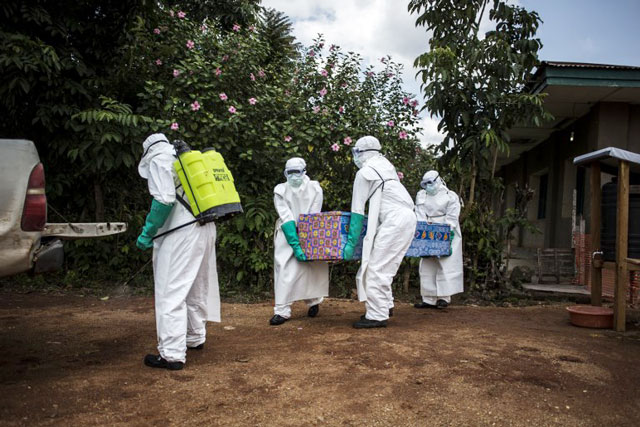
Butembo, DR Congo | AFP | People in Ebola-hit eastern DR Congo are struggling to come to terms with high-security burials that are part of a hard-pressed strategy to roll back the disease.
Anyone who dies of the highly infectious haemorrhagic fever has to be buried in carefully-controlled conditions designed to minimise the risk of infection from body fluids.
But that means ceremonies are carried out in sanitised conditions, with relatives and friends kept at a distance — for many, a traumatic break with traditions that demand the body of a loved-one be seen or touched.
“We’re astonished she’s being buried like this,” said Denise Kahambu as she watched the specially-prepared burial in Butembo of her 50-year-old cousin, Marie-Rose.
“They said she died of Ebola,” she said sceptically.
First declared last August, the epidemic has now claimed nearly 1,200 lives — 200 of them in May alone.
The outbreak is the second deadliest on record, after an epidemic that killed more than 11,300 people in West Africa in 2014-16.
The burial in Butembo followed strict precautions. A pick-up truck delivered the coffin to the burial site, where a grave had been prepared, as the family stood by at a distance.
Gloved Red Cross workers handled the burial, which took place in silence and without a religious ceremony.
A family member or loved one was allowed only to place a cross on the tomb, once they too had donned protective gloves.
Half a dozen police officers escorted the convoy and remained on guard throughout.
On Friday, two burial teams from the treatment centres were attacked by stone-throwing crowds at Butembo and Bunia, a little further north in Ituri province, according to the health ministry. One burial worker was injured.
– Culture shock –
“The custom is that the body of the deceased first returns to the home. And once people have mourned, they have the chance to touch the body for the last time,” said Seros Muyisa Kamathe, a guide and interpreter in Beni and Butembo.
“Before going to the cemetery, you open the coffin so people can take one last look at the deceased.”
And normally it would be the family and neighbours who would take responsibility for digging the grave — and deciding where if should be.
Ebola experts say denial and resistance were familiar obstacles in the 2014-16 epidemic in the West African states of Guinea, Liberia and Sierra Leone.
The World Health Organization (WHO) has a 12-step protocol for dealing with burials so that handling of the remains is kept to a minimum, but it also emphasises the importance of respect and mourning.
“The burial process is very sensitive for the family and the community and can be the source of trouble or even open conflict,” it acknowledges.
No burial should begin until family agreement has been obtained, and workers should engage with the community “for prayers to dissipate tensions and provide respectful time,” it says.
– Armed escorts –
The burial process is part of the notoriously time-consuming and labour-intensive task of combatting Ebola.
And in this troubled region, the challenge has been further complicated by bloody deadly attacks on Ebola treatment centres by local militias.
Suspicion, political infighting in the capital Kinshasa and militia violence provide a fertile breeding ground for the virus.
Sometimes local people cover the graves overnight as a sign of their opposition, the ministry said.
In Butembo, health workers need an armed escort when they go looking for cases of Ebola in some neighbourhoods, an AFP photographer noted during one outing Saturday evening.
WHO Director-General Tedros Adhanom Ghebreyesus, at the opening of the organisation’s annual assembly on Monday, described the outbreak as “one of the most complex health emergencies any of us have ever faced.”
“Unless we unite to end this outbreak we run the risk it will become more widespread and more expansive and more aggressive,” he said.
“We are not just fighting a virus,” Tedros insisted. “We’re fighting insecurity. We’re fighting violence. We’re fighting misinformation… and we’re fighting the politicisation of an outbreak.”
On the plus side, health officials are keen to emphasise some important gains. More than 118,000 have been vaccinated against the virus, and no cases have been recorded in neighbouring Rwanda and Uganda
 The Independent Uganda: You get the Truth we Pay the Price
The Independent Uganda: You get the Truth we Pay the Price





